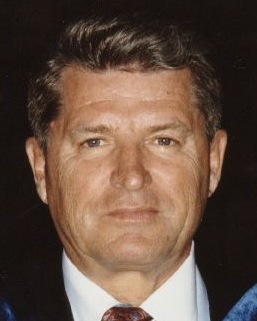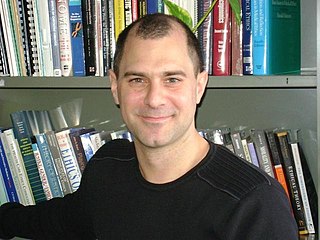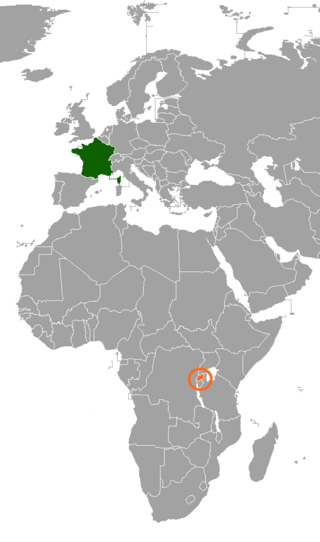
In the 19th century France built a new French colonial empire second only to the British Empire. It was humiliated in the Franco-Prussian War of 1870–71, which marked the rise of Germany to dominance in Europe. France allied with Great Britain and Russia and was on the winning side of the First World War. Although it was initially easily defeated early in the Second World War, Free France, through its Free French Forces and the Resistance, continued to fight against the Axis powers as an Allied nation and was ultimately considered one of the victors of the war, as the allocation of a French occupation zone in Germany and West Berlin testifies, as well as the status of permanent member of the United Nations Security Council. It fought losing colonial wars in Indochina and Algeria. The Fourth Republic collapsed and the Fifth Republic began in 1958 to the present. Under Charles De Gaulle it tried to block American and British influence on the European community. Since 1945, France has been a founding member of the United Nations, of NATO, and of the European Coal and Steel Community. As a charter member of the United Nations, France holds one of the permanent seats in the Security Council and is a member of most of its specialized and related agencies.

The Office national d'études et de recherches aérospatiales (ONERA) is the French national aerospace research centre. It is a public establishment with industrial and commercial operations, and carries out application-oriented research to support enhanced innovation and competitiveness in the aerospace and defense sectors.

Rodrigue Tremblay is a Canadian economist, humanist and political figure. He is an emeritus professor of economics at the Université de Montréal. He specializes in macroeconomics, international trade and finance, and public finance. He is the author of books in economics and politics. Tremblay's documents and archives are kept at the Center of Archives of the Quebec National Library and Archives, in Montreal, Quebec.

Jamshid Momtaz is an Iranian jurist and academic.

Sandra Laugier is a French philosopher, who works on moral philosophy, political philosophy, philosophy of language, gender studies, and popular culture. She is a full professor of philosophy at the University of Paris 1 Panthéon-Sorbonne and a Senior member of the Institut Universitaire de France. She currently serves as the deputy director of the Institut des sciences juridique et philosophique de la Sorbonne. In 2014, she received the title of the Chevalier de la Légion d’honneur. In 2022, she was awarded the Grand Prix Moron by the Académie française.
An établissement public à caractère industriel et commercial is, in France, a category of public undertaking. It includes state-controlled entities of an industrial or commercial nature, including some research institutes and infrastructure operators. Some former French colonies, such as Algeria, Burkina Faso and Mauritania also use this term for such agencies.
Guy Pedroncini (1924–2006) was a French academic and military historian specialising in the First World War, and notable as the biographer of Philippe Pétain and for his work on the French army mutinies of 1917. He was born in Paris on 17 May 1924 and died on 11 July 2006, at the age of 82.

Thomas Gomart is a French historian of international relations and the director of IFRI since 2015. He was previously vice-president for strategic development at IFRI, and director of the Russia/NIS Center and of the trilingual electronic collection Russie.NEI.Visions in English.
Maurice Vaïsse is a French historian specialised in international relations and Defence. He is an editorial board member on Journal of Intelligence and Terrorism Studies.
Mohamed Bennouna is a Moroccan diplomat and jurist. He worked as a professor at the Mohammed V University, as a permanent representative of his native country at the United Nations from 1998 to 2001, as a Judge of the International Criminal Tribunal for the former Yugoslavia, and as a judge of the International Court of Justice from 2006 to 2024.
Josepha Laroche is a French professor of political science, specializing in international relations. She is professor at the University of Paris 1 Pantheon-Sorbonne, where she is Director of the master's program of research in international relations, and is also researcher at the UMR 201 Développement et sociétés. She was also Institut d'Études Politiques de Paris from 2004 to 2009.
Georges-Elia Sarfati is a philosopher, linguist, poet, and an existentialist psychoanalyst, author of written works in the domains of ethics, Jewish thought, social criticism, and discourse analysis. He has translated Viktor E. Frankl. He is the grand-nephew of the sociologist Gaston Bouthoul.

Bassma Kodmani was a Syrian academic who was spokesperson of the Syrian National Council. She was the executive director of the Arab Reform Initiative, a network of independent Arab research and policy institutes working to promote democracy in the Arab world.

The Corps de l'armement, or corps des ingénieurs de l'armement is a Technical Grand Corps of the French State, aimed at providing the French Armed Forces with all appropriate equipment and at supervising the French Aerospace & Defence industry.
The Geneva International Peace Research Institute is a non-governmental organisation based in Geneva.

Thierry Pauchant is a professor at École des hautes études commerciales de Montréal, where he founded the Ethics Management Chair.

Bryn Williams-Jones is a Canadian bioethicist, professor and director of the Department of Social and Preventive Medicine at the School of Public Health, Université de Montréal. He is co-founder and editor-in-chief of the Canadian Journal of Bioethics/Revue canadienne de bioéthique, the first open access bilingual bioethics journal in Canada, and co-director of the Ethics branch of the International Observatory on the Social Impact of AI and Digital Technology (OBVIA). Williams-Jones is a member of the Centre for Research in Public Health (CReSP), the Centre for Ethics Research (CRÉ), the Institute for Applied Ethics (IDÉA) of the Université Laval, and fellow of The Hastings Center.

Valéry Giroux is a Canadian philosopher, lawyer and animal rights activist from Quebec. She is an adjunct professor at the Université de Montréal Faculty of Law, associate director for the Centre de recherche en éthique, a Fellow of the Oxford Centre for Animal Ethics, and an author and speaker on animal ethics issues and veganism, with a notable focus on the topic of antispeciesism through her co-editorship of the antispeciesist journal L'Amorce. Her philosophy argues for the equal moral consideration of all sentient beings, objects to the ethical notion that the utilization of non-human animals by humans as being morally permissible, and advocates for the individual right to freedom for all sentient beings, regardless of their species, emphasizing negative or republican freedom over positive freedom.

France–Rwanda relations are the international relations between France and Rwanda.
Thomas Lindemann is a Franco-German Distinguished Professor of International Relations at the University of Versailles Saint-Quentin-en-Yvelines and the École polytechnique. Lindemann is best known for his development of the constructivist school of thought and more specifically, his research on the Theory of (mis)recognition as a central cause in the outbreak of international conflict and maintenance of international peace. In 2019, Lindemann was nominated to the National Council of Universities as a titular member of Section 04 in Political Science.













